Deck 7: Integration
Question
Question
Question
Question
Question
Question
Question
Question
Question
Question
Question
Question
Question
Question
Question
Question
Question
Question
Question
Question
Question
Question
Question
Question
Question
Question
Question
Question
Question
Question
Question
Question
Question
Question
Question
Question
Question
Question
Question
Question
Question
Question
Question
Question
Question
Question
Question
Question
Question
Question
Question
Question
Question
Question
Question
Question
Question
Question
Question
Question
Question
Question
Question
Question

Unlock Deck
Sign up to unlock the cards in this deck!
Unlock Deck
Unlock Deck
1/64
Play
Full screen (f)
Deck 7: Integration
1
Find the limit of s(n) as n  .
. 
A)6/7
B)12/7
C)1/7
D)6
E)unbounded
 .
. 
A)6/7
B)12/7
C)1/7
D)6
E)unbounded
unbounded
2
Use the properties of summation and Theorem 4.2 to evaluate the sum. 
A)1386
B)1610
C)1162
D)1080
E)1161

A)1386
B)1610
C)1162
D)1080
E)1161
1162
3
Find the indefinite integral  .
.
A)
B)
C)
D)
E)
 .
.A)

B)

C)

D)

E)


4
Find the limit of s(n) as n  .
. 
A)3/4
B)3/2
C)1/4
D)unbounded
E)3
 .
. 
A)3/4
B)3/2
C)1/4
D)unbounded
E)3

Unlock Deck
Unlock for access to all 64 flashcards in this deck.
Unlock Deck
k this deck
5
An evergreen nursery usually sells a certain shrub after 4 years of growth and shaping. The growth rate during those 4 years is approximated by  where t is the time in years and h is the height in centimeters. The seedlings are 11 centimeters tall when planted
where t is the time in years and h is the height in centimeters. The seedlings are 11 centimeters tall when planted  . Find the height after t years.
. Find the height after t years.
A)
B)
C)
D)
E)
 where t is the time in years and h is the height in centimeters. The seedlings are 11 centimeters tall when planted
where t is the time in years and h is the height in centimeters. The seedlings are 11 centimeters tall when planted  . Find the height after t years.
. Find the height after t years.A)

B)

C)

D)

E)


Unlock Deck
Unlock for access to all 64 flashcards in this deck.
Unlock Deck
k this deck
6
Find the indefinite integral  .
.
A)
B)
C)
D)
E)
 .
.A)

B)

C)

D)

E)


Unlock Deck
Unlock for access to all 64 flashcards in this deck.
Unlock Deck
k this deck
7
Find the indefinite integral and check the result by differentiation. 
A)
B)
C)
D)
E)

A)

B)

C)

D)

E)


Unlock Deck
Unlock for access to all 64 flashcards in this deck.
Unlock Deck
k this deck
8
Find the indefinite integral  .
.
A)
B)
C)
D)
E)none of the above
 .
.A)

B)

C)

D)

E)none of the above

Unlock Deck
Unlock for access to all 64 flashcards in this deck.
Unlock Deck
k this deck
9
Use sigma notation to write the sum  .
.
A)
B)
C)
D)
E)
 .
.A)

B)

C)

D)

E)


Unlock Deck
Unlock for access to all 64 flashcards in this deck.
Unlock Deck
k this deck
10
Find the general solution of the differential equation below and check the result by differentiation. 
A)
B)
C)
D)
E)

A)

B)

C)

D)

E)


Unlock Deck
Unlock for access to all 64 flashcards in this deck.
Unlock Deck
k this deck
11
The height above the ground of an object thrown upward from a point  feet above the ground with an initial velocity of
feet above the ground with an initial velocity of  feet per second is given by the function
feet per second is given by the function  . A balloon, rising vertically with a velocity of 20 feet per second, releases a sandbag at the instant it is 44 feet above the ground. How many seconds after its release will the bag strike the ground? Round your answer to three decimal places.
. A balloon, rising vertically with a velocity of 20 feet per second, releases a sandbag at the instant it is 44 feet above the ground. How many seconds after its release will the bag strike the ground? Round your answer to three decimal places.
A)2.289 seconds
B)2.397 seconds
C)1.375 seconds
D)1.147 seconds
E)1.298 seconds
 feet above the ground with an initial velocity of
feet above the ground with an initial velocity of  feet per second is given by the function
feet per second is given by the function  . A balloon, rising vertically with a velocity of 20 feet per second, releases a sandbag at the instant it is 44 feet above the ground. How many seconds after its release will the bag strike the ground? Round your answer to three decimal places.
. A balloon, rising vertically with a velocity of 20 feet per second, releases a sandbag at the instant it is 44 feet above the ground. How many seconds after its release will the bag strike the ground? Round your answer to three decimal places.A)2.289 seconds
B)2.397 seconds
C)1.375 seconds
D)1.147 seconds
E)1.298 seconds

Unlock Deck
Unlock for access to all 64 flashcards in this deck.
Unlock Deck
k this deck
12
Use the properties of summation and Theorem 4.2 to evaluate the sum. 
A)4930
B)335
C)10,409
D)5555
E)5533

A)4930
B)335
C)10,409
D)5555
E)5533

Unlock Deck
Unlock for access to all 64 flashcards in this deck.
Unlock Deck
k this deck
13
Find the sum given below. 
A)518
B)224
C)350
D)154
E)220

A)518
B)224
C)350
D)154
E)220

Unlock Deck
Unlock for access to all 64 flashcards in this deck.
Unlock Deck
k this deck
14
Find the sum given below. 
A)175
B)140
C)105
D)135
E)165

A)175
B)140
C)105
D)135
E)165

Unlock Deck
Unlock for access to all 64 flashcards in this deck.
Unlock Deck
k this deck
15
A ball is thrown vertically upwards from a height of 7 ft with an initial velocity of 45 ft per second. How high will the ball go? Note that the acceleration of the ball is given by  feet per second per second.
feet per second per second.
A)101.9219 ft
B)30.7305 ft
C)38.6406 ft
D)87.9219 ft
E)103.7219 ft
 feet per second per second.
feet per second per second.A)101.9219 ft
B)30.7305 ft
C)38.6406 ft
D)87.9219 ft
E)103.7219 ft

Unlock Deck
Unlock for access to all 64 flashcards in this deck.
Unlock Deck
k this deck
16
The maker of an automobile advertises that it takes 11 seconds to accelerate from 30 kilometers per hour to 75 kilometers per hour. Assuming constant acceleration, compute the acceleration in meters per second per second. Round your answer to three decimal places.
A)1.250 m/sec2
B)2.652 m/sec2
C)2.917 m/sec2
D)2.557 m/sec2
E)1.136 m/sec2
A)1.250 m/sec2
B)2.652 m/sec2
C)2.917 m/sec2
D)2.557 m/sec2
E)1.136 m/sec2

Unlock Deck
Unlock for access to all 64 flashcards in this deck.
Unlock Deck
k this deck
17
The rate of growth  of a population of bacteria is proportional to the square root of t, where P is the population size and t is the time in days
of a population of bacteria is proportional to the square root of t, where P is the population size and t is the time in days  That is,
That is,  . The initial size of the population is 300. After one day the population has grown to 400. Estimate the population after 9 days. Round your answer to the nearest integer.
. The initial size of the population is 300. After one day the population has grown to 400. Estimate the population after 9 days. Round your answer to the nearest integer.
A) bacteria
bacteria
B) bacteria
bacteria
C) bacteria
bacteria
D) bacteria
bacteria
E) bacteria
bacteria
 of a population of bacteria is proportional to the square root of t, where P is the population size and t is the time in days
of a population of bacteria is proportional to the square root of t, where P is the population size and t is the time in days  That is,
That is,  . The initial size of the population is 300. After one day the population has grown to 400. Estimate the population after 9 days. Round your answer to the nearest integer.
. The initial size of the population is 300. After one day the population has grown to 400. Estimate the population after 9 days. Round your answer to the nearest integer.A)
 bacteria
bacteriaB)
 bacteria
bacteriaC)
 bacteria
bacteriaD)
 bacteria
bacteriaE)
 bacteria
bacteria
Unlock Deck
Unlock for access to all 64 flashcards in this deck.
Unlock Deck
k this deck
18
Use the properties of summation and Theorem 4.2 to evaluate the sum. 
A)4411
B)77,275
C)4319
D)65,016
E)77,259

A)4411
B)77,275
C)4319
D)65,016
E)77,259

Unlock Deck
Unlock for access to all 64 flashcards in this deck.
Unlock Deck
k this deck
19
Find the general solution of the differential equation below and check the result by differentiation. 
A)
B)
C)
D)
E)

A)

B)

C)

D)

E)


Unlock Deck
Unlock for access to all 64 flashcards in this deck.
Unlock Deck
k this deck
20
Find the sum given below. 
A)
B)
C)
D)
E)

A)

B)

C)

D)

E)


Unlock Deck
Unlock for access to all 64 flashcards in this deck.
Unlock Deck
k this deck
21
The graph of f consists of line segments, as shown in the figure. Evaluate the definite integral  using geometric formulas.
using geometric formulas. 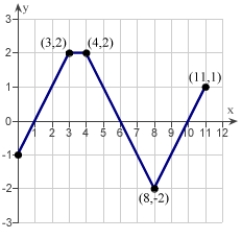
A)-2
B)0
C)-3
D)-4
E)-1
 using geometric formulas.
using geometric formulas. 
A)-2
B)0
C)-3
D)-4
E)-1

Unlock Deck
Unlock for access to all 64 flashcards in this deck.
Unlock Deck
k this deck
22
Find the limit  .
.
A)48
B)24
C)14
D)28
E)12
 .
.A)48
B)24
C)14
D)28
E)12

Unlock Deck
Unlock for access to all 64 flashcards in this deck.
Unlock Deck
k this deck
23
Sketch the region whose area is given by the definite integral and then use a geometric formula to evaluate the integral. 
A)9
B)4
C)5.5
D)1
E)33.5

A)9
B)4
C)5.5
D)1
E)33.5

Unlock Deck
Unlock for access to all 64 flashcards in this deck.
Unlock Deck
k this deck
24
Sketch the region whose area is given by the definite integral and then use a geometric formula to evaluate the integral. 
A)
B)
C)
D)
E)

A)

B)

C)

D)

E)


Unlock Deck
Unlock for access to all 64 flashcards in this deck.
Unlock Deck
k this deck
25
Write the limit  as a definite integral on the interval
as a definite integral on the interval  where ci is any point in the ith subinterval.
where ci is any point in the ith subinterval.
A)
B)
C)
D)
E)
 as a definite integral on the interval
as a definite integral on the interval  where ci is any point in the ith subinterval.
where ci is any point in the ith subinterval.A)

B)

C)

D)

E)


Unlock Deck
Unlock for access to all 64 flashcards in this deck.
Unlock Deck
k this deck
26
Evaluate the following definite integral by the limit definition. 
A)
B)
C)
D)
E)

A)

B)

C)

D)

E)


Unlock Deck
Unlock for access to all 64 flashcards in this deck.
Unlock Deck
k this deck
27
Evaluate the integral  given
given 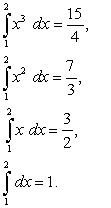
A)12
B)18
C)28
D)-18
E)45
 given
given 
A)12
B)18
C)28
D)-18
E)45

Unlock Deck
Unlock for access to all 64 flashcards in this deck.
Unlock Deck
k this deck
28
Write the limit  as a definite integral on the interval
as a definite integral on the interval  where
where  is any point in the
is any point in the  subinterval.
subinterval.
A)
B)
C)
D)
E)
 as a definite integral on the interval
as a definite integral on the interval  where
where  is any point in the
is any point in the  subinterval.
subinterval.A)

B)

C)

D)

E)


Unlock Deck
Unlock for access to all 64 flashcards in this deck.
Unlock Deck
k this deck
29
Use the summation formulas to rewrite the expression  without the summation notation.
without the summation notation.
A)
B)
C)
D)
E)
 without the summation notation.
without the summation notation.A)

B)

C)

D)

E)


Unlock Deck
Unlock for access to all 64 flashcards in this deck.
Unlock Deck
k this deck
30
Evaluate the following definite integral by the limit definition. 
A)-351
B)-339
C)351
D)339
E)-363

A)-351
B)-339
C)351
D)339
E)-363

Unlock Deck
Unlock for access to all 64 flashcards in this deck.
Unlock Deck
k this deck
31
The graph of the function  is given below. Which of the following definite integrals yields the area of the shaded region?
is given below. Which of the following definite integrals yields the area of the shaded region? 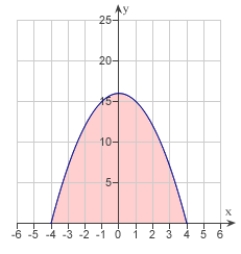
A)
B)
C)
D)
E)
 is given below. Which of the following definite integrals yields the area of the shaded region?
is given below. Which of the following definite integrals yields the area of the shaded region? 
A)

B)

C)

D)

E)


Unlock Deck
Unlock for access to all 64 flashcards in this deck.
Unlock Deck
k this deck
32
Evaluate the definite integral of the algebraic function.  Use a graphing utility to verify your results.
Use a graphing utility to verify your results.
A)2643
B)-2541
C)2541
D)5235
E)51
 Use a graphing utility to verify your results.
Use a graphing utility to verify your results.A)2643
B)-2541
C)2541
D)5235
E)51

Unlock Deck
Unlock for access to all 64 flashcards in this deck.
Unlock Deck
k this deck
33
Sketch the region whose area is given by the definite integral and then use a geometric formula to evaluate the integral. 
A)
B)
C)
D)
E)

A)

B)

C)

D)

E)


Unlock Deck
Unlock for access to all 64 flashcards in this deck.
Unlock Deck
k this deck
34
Evaluate the definite integral of the algebraic function.  Use a graphing utility to verify your results.
Use a graphing utility to verify your results.
A)10
B)20
C)-6
D)12
E)-11
 Use a graphing utility to verify your results.
Use a graphing utility to verify your results.A)10
B)20
C)-6
D)12
E)-11

Unlock Deck
Unlock for access to all 64 flashcards in this deck.
Unlock Deck
k this deck
35
The graph of the function  is given below. Which of the following definite integrals yields the area of the shaded region?
is given below. Which of the following definite integrals yields the area of the shaded region? 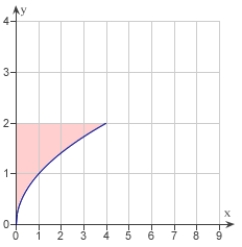
A)
B)
C)
D)
E)
 is given below. Which of the following definite integrals yields the area of the shaded region?
is given below. Which of the following definite integrals yields the area of the shaded region? 
A)

B)

C)

D)

E)


Unlock Deck
Unlock for access to all 64 flashcards in this deck.
Unlock Deck
k this deck
36
Evaluate the integral  given
given 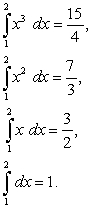
A)8
B)-73
C)-18
D)-40
E)-13
 given
given 
A)8
B)-73
C)-18
D)-40
E)-13

Unlock Deck
Unlock for access to all 64 flashcards in this deck.
Unlock Deck
k this deck
37
The diagram below shows upper and lower sums for the function  using 4 subintervals. Use upper and lower sums to approximate the area of the region using the 4 subintervals.
using 4 subintervals. Use upper and lower sums to approximate the area of the region using the 4 subintervals. 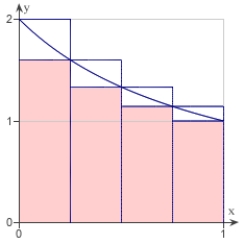
A)lower: 1.019 ; upper: 1.769
B)lower: 1.269 ; upper: 1.519
C)lower: 5.076 ; upper: 6.076
D)lower: 2.538 ; upper: 3.038
 using 4 subintervals. Use upper and lower sums to approximate the area of the region using the 4 subintervals.
using 4 subintervals. Use upper and lower sums to approximate the area of the region using the 4 subintervals. 
A)lower: 1.019 ; upper: 1.769
B)lower: 1.269 ; upper: 1.519
C)lower: 5.076 ; upper: 6.076
D)lower: 2.538 ; upper: 3.038

Unlock Deck
Unlock for access to all 64 flashcards in this deck.
Unlock Deck
k this deck
38
Use the limit process to find the area of the region between the graph of the function  and x-axis over the interval
and x-axis over the interval  .
.
A)
B)
C)
D)
E)
 and x-axis over the interval
and x-axis over the interval  .
.A)

B)

C)

D)

E)


Unlock Deck
Unlock for access to all 64 flashcards in this deck.
Unlock Deck
k this deck
39
Write the following limit as a definite integral on the interval [5 , 11], where ci is any point in the ith subinterval. ![<strong>Write the following limit as a definite integral on the interval [5 , 11], where c<sub>i </sub>is any point in the ith subinterval. </strong> A) B) C) D) E)](https://storage.examlex.com/TBX8702/11ec1854_fd9c_bd70_acfc_bdc3c161699b_TBX8702_11.jpg)
A)![<strong>Write the following limit as a definite integral on the interval [5 , 11], where c<sub>i </sub>is any point in the ith subinterval. </strong> A) B) C) D) E)](https://storage.examlex.com/TBX8702/11ec1854_fd9c_bd71_acfc_8992396e0f74_TBX8702_11.jpg)
B)![<strong>Write the following limit as a definite integral on the interval [5 , 11], where c<sub>i </sub>is any point in the ith subinterval. </strong> A) B) C) D) E)](https://storage.examlex.com/TBX8702/11ec1854_fd9c_bd72_acfc_f5a6f86e1d00_TBX8702_11.jpg)
C)![<strong>Write the following limit as a definite integral on the interval [5 , 11], where c<sub>i </sub>is any point in the ith subinterval. </strong> A) B) C) D) E)](https://storage.examlex.com/TBX8702/11ec1854_fd9c_bd73_acfc_237c0ef199d8_TBX8702_11.jpg)
D)![<strong>Write the following limit as a definite integral on the interval [5 , 11], where c<sub>i </sub>is any point in the ith subinterval. </strong> A) B) C) D) E)](https://storage.examlex.com/TBX8702/11ec1854_fd9c_e484_acfc_85c27720d70e_TBX8702_11.jpg)
E)![<strong>Write the following limit as a definite integral on the interval [5 , 11], where c<sub>i </sub>is any point in the ith subinterval. </strong> A) B) C) D) E)](https://storage.examlex.com/TBX8702/11ec1854_fd9c_e485_acfc_8bc1d5f0ef65_TBX8702_11.jpg)
![<strong>Write the following limit as a definite integral on the interval [5 , 11], where c<sub>i </sub>is any point in the ith subinterval. </strong> A) B) C) D) E)](https://storage.examlex.com/TBX8702/11ec1854_fd9c_bd70_acfc_bdc3c161699b_TBX8702_11.jpg)
A)
![<strong>Write the following limit as a definite integral on the interval [5 , 11], where c<sub>i </sub>is any point in the ith subinterval. </strong> A) B) C) D) E)](https://storage.examlex.com/TBX8702/11ec1854_fd9c_bd71_acfc_8992396e0f74_TBX8702_11.jpg)
B)
![<strong>Write the following limit as a definite integral on the interval [5 , 11], where c<sub>i </sub>is any point in the ith subinterval. </strong> A) B) C) D) E)](https://storage.examlex.com/TBX8702/11ec1854_fd9c_bd72_acfc_f5a6f86e1d00_TBX8702_11.jpg)
C)
![<strong>Write the following limit as a definite integral on the interval [5 , 11], where c<sub>i </sub>is any point in the ith subinterval. </strong> A) B) C) D) E)](https://storage.examlex.com/TBX8702/11ec1854_fd9c_bd73_acfc_237c0ef199d8_TBX8702_11.jpg)
D)
![<strong>Write the following limit as a definite integral on the interval [5 , 11], where c<sub>i </sub>is any point in the ith subinterval. </strong> A) B) C) D) E)](https://storage.examlex.com/TBX8702/11ec1854_fd9c_e484_acfc_85c27720d70e_TBX8702_11.jpg)
E)
![<strong>Write the following limit as a definite integral on the interval [5 , 11], where c<sub>i </sub>is any point in the ith subinterval. </strong> A) B) C) D) E)](https://storage.examlex.com/TBX8702/11ec1854_fd9c_e485_acfc_8bc1d5f0ef65_TBX8702_11.jpg)

Unlock Deck
Unlock for access to all 64 flashcards in this deck.
Unlock Deck
k this deck
40
Evaluate the definite integral of the algebraic function.  Use a graphing utility to verify your results.
Use a graphing utility to verify your results.
A)
B)
C)
D)
E)
 Use a graphing utility to verify your results.
Use a graphing utility to verify your results.A)

B)

C)

D)

E)


Unlock Deck
Unlock for access to all 64 flashcards in this deck.
Unlock Deck
k this deck
41
Find the indefinite integral of the following function and check the result by differentiation. 
A)
B)
C)
D)
E)

A)

B)

C)

D)

E)


Unlock Deck
Unlock for access to all 64 flashcards in this deck.
Unlock Deck
k this deck
42
Find the indefinite integral of the following function and check the result by differentiation. 
A)
B)
C)
D)
E)

A)

B)

C)

D)

E)


Unlock Deck
Unlock for access to all 64 flashcards in this deck.
Unlock Deck
k this deck
43
Find F'(x) given  .
.
A)
B)
C)
D)
E)
 .
.A)

B)

C)

D)

E)


Unlock Deck
Unlock for access to all 64 flashcards in this deck.
Unlock Deck
k this deck
44
The total cost C (in dollars) of purchasing and maintaining a piece of equipment for x years is  Perform the integration to write C as a function of x.
Perform the integration to write C as a function of x.
A)
B)
C)
D)
E)
 Perform the integration to write C as a function of x.
Perform the integration to write C as a function of x.A)

B)

C)

D)

E)


Unlock Deck
Unlock for access to all 64 flashcards in this deck.
Unlock Deck
k this deck
45
Find the indefinite integral  .
.
A)
B)
C)
D)
E)
 .
.A)

B)

C)

D)

E)


Unlock Deck
Unlock for access to all 64 flashcards in this deck.
Unlock Deck
k this deck
46
Find the indefinite integral  .
.
A)
B)
C)
D)
E)
 .
.A)

B)

C)

D)

E)


Unlock Deck
Unlock for access to all 64 flashcards in this deck.
Unlock Deck
k this deck
47
Find the average value of  on the interval
on the interval  .
.
A)
B)
C)
D)
E)
 on the interval
on the interval  .
.A)

B)

C)

D)

E)


Unlock Deck
Unlock for access to all 64 flashcards in this deck.
Unlock Deck
k this deck
48
Solve the differential equation. 
A)
B)
C)
D)
E)

A)

B)

C)

D)

E)


Unlock Deck
Unlock for access to all 64 flashcards in this deck.
Unlock Deck
k this deck
49
Find the area of the region bounded by the graphs of the equations  . Round your answer to the nearest whole number.
. Round your answer to the nearest whole number.
A)12
B)53
C)29
D)9
E)128
 . Round your answer to the nearest whole number.
. Round your answer to the nearest whole number.A)12
B)53
C)29
D)9
E)128

Unlock Deck
Unlock for access to all 64 flashcards in this deck.
Unlock Deck
k this deck
50
Suppose that the probability that a person will remember between 100a% and 100b% of material learned in an experiment is  where x represents the proportion remembered. Determine from the figure below, the probability that a randomly chosen individual will recall between 30% and 75% of the material? Express your answer as a percent rounded to three decimal places.
where x represents the proportion remembered. Determine from the figure below, the probability that a randomly chosen individual will recall between 30% and 75% of the material? Express your answer as a percent rounded to three decimal places. 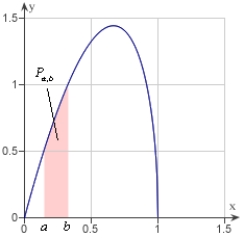
A)12.100%
B)154.300%
C)58.400%
D)3.300%
E)12.300%
 where x represents the proportion remembered. Determine from the figure below, the probability that a randomly chosen individual will recall between 30% and 75% of the material? Express your answer as a percent rounded to three decimal places.
where x represents the proportion remembered. Determine from the figure below, the probability that a randomly chosen individual will recall between 30% and 75% of the material? Express your answer as a percent rounded to three decimal places. 
A)12.100%
B)154.300%
C)58.400%
D)3.300%
E)12.300%

Unlock Deck
Unlock for access to all 64 flashcards in this deck.
Unlock Deck
k this deck
51
Evaluate the following definite integral.  Use a graphing utility to check your answer.
Use a graphing utility to check your answer.
A)
B)
C)
D)
E)
 Use a graphing utility to check your answer.
Use a graphing utility to check your answer.A)

B)

C)

D)

E)


Unlock Deck
Unlock for access to all 64 flashcards in this deck.
Unlock Deck
k this deck
52
Find the indefinite integral of the following function and check the result by differentiation. 
A)
B)
C)
D)
E)

A)

B)

C)

D)

E)


Unlock Deck
Unlock for access to all 64 flashcards in this deck.
Unlock Deck
k this deck
53
Find the average value of the function  over the interval
over the interval  .
.
A)
B)
C)
D)
E)
 over the interval
over the interval  .
.A)

B)

C)

D)

E)


Unlock Deck
Unlock for access to all 64 flashcards in this deck.
Unlock Deck
k this deck
54
Use the Trapezoid Rule to approximate the value of the definite integral  wth
wth  . Round your answer to four decimal places.
. Round your answer to four decimal places.
A)6.3750
B)33.0000
C)6.7500
D)7.8750
E)8.2500
 wth
wth  . Round your answer to four decimal places.
. Round your answer to four decimal places.A)6.3750
B)33.0000
C)6.7500
D)7.8750
E)8.2500

Unlock Deck
Unlock for access to all 64 flashcards in this deck.
Unlock Deck
k this deck
55
The rate of depreciation  of a machine is inversely proportional to the square of
of a machine is inversely proportional to the square of  where V is the value of the machine t years after it was purchased. The initial value of the machine was
where V is the value of the machine t years after it was purchased. The initial value of the machine was  and its value decreased
and its value decreased  in the first year. Estimate its value after 5 years. Round your answer to the nearest integer.
in the first year. Estimate its value after 5 years. Round your answer to the nearest integer.
A)$500,000
B)$285,714
C)$571,428
D)$485,714
E)$371,429
 of a machine is inversely proportional to the square of
of a machine is inversely proportional to the square of  where V is the value of the machine t years after it was purchased. The initial value of the machine was
where V is the value of the machine t years after it was purchased. The initial value of the machine was  and its value decreased
and its value decreased  in the first year. Estimate its value after 5 years. Round your answer to the nearest integer.
in the first year. Estimate its value after 5 years. Round your answer to the nearest integer.A)$500,000
B)$285,714
C)$571,428
D)$485,714
E)$371,429

Unlock Deck
Unlock for access to all 64 flashcards in this deck.
Unlock Deck
k this deck
56
Find F'(x) given  .
.
A)
B)
C)
D)
E)
 .
.A)

B)

C)

D)

E)


Unlock Deck
Unlock for access to all 64 flashcards in this deck.
Unlock Deck
k this deck
57
The rate of disbursement  of a 2 million dollar federal grant is proportional to the square of
of a 2 million dollar federal grant is proportional to the square of  Time t is measured in days
Time t is measured in days  and
and  is the amount that remains to be disbursed. Find the amount that remains to be disbursed after 60 days. Assume that all the money will be disbursed in 200 days.
is the amount that remains to be disbursed. Find the amount that remains to be disbursed after 60 days. Assume that all the money will be disbursed in 200 days.
A)$686,000
B)$1,029,000
C)$50,700
D)$16,900
E)$25,350
 of a 2 million dollar federal grant is proportional to the square of
of a 2 million dollar federal grant is proportional to the square of  Time t is measured in days
Time t is measured in days  and
and  is the amount that remains to be disbursed. Find the amount that remains to be disbursed after 60 days. Assume that all the money will be disbursed in 200 days.
is the amount that remains to be disbursed. Find the amount that remains to be disbursed after 60 days. Assume that all the money will be disbursed in 200 days.A)$686,000
B)$1,029,000
C)$50,700
D)$16,900
E)$25,350

Unlock Deck
Unlock for access to all 64 flashcards in this deck.
Unlock Deck
k this deck
58
Find the indefinite integral  .
.
A)
B)
C)
D)
E)
 .
.A)

B)

C)

D)

E)


Unlock Deck
Unlock for access to all 64 flashcards in this deck.
Unlock Deck
k this deck
59
Solve the differential equation. 
A)
B)
C)
D)
E)

A)

B)

C)

D)

E)


Unlock Deck
Unlock for access to all 64 flashcards in this deck.
Unlock Deck
k this deck
60
Determine the area of the given region. 
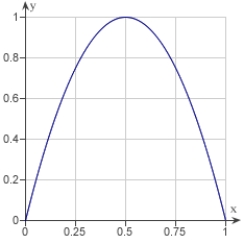
A)
B)
C)
D)
E)


A)

B)

C)

D)

E)


Unlock Deck
Unlock for access to all 64 flashcards in this deck.
Unlock Deck
k this deck
61
Use Simpson's Rule to approximate the value of the definite integral  with
with  . Round your answer to four decimal places.
. Round your answer to four decimal places.
A)48.4495
B)59.3159
C)62.6492
D)69.3159
E)52.6492
 with
with  . Round your answer to four decimal places.
. Round your answer to four decimal places.A)48.4495
B)59.3159
C)62.6492
D)69.3159
E)52.6492

Unlock Deck
Unlock for access to all 64 flashcards in this deck.
Unlock Deck
k this deck
62
Use a computer algebra system and Simpson's Rule with  to approximate t in the integral equation
to approximate t in the integral equation  . Round your answer to three decimal places.
. Round your answer to three decimal places.
A)6.385
B)6.045
C)5.715
D)6.008
E)5.985
 to approximate t in the integral equation
to approximate t in the integral equation  . Round your answer to three decimal places.
. Round your answer to three decimal places.A)6.385
B)6.045
C)5.715
D)6.008
E)5.985

Unlock Deck
Unlock for access to all 64 flashcards in this deck.
Unlock Deck
k this deck
63
Find the smallest n such that the error estimate in the approximation of the definite integral  is less than 0.00001 using Simpson's Rule.
is less than 0.00001 using Simpson's Rule.
A)5
B)12
C)7
D)15
E)9
 is less than 0.00001 using Simpson's Rule.
is less than 0.00001 using Simpson's Rule.A)5
B)12
C)7
D)15
E)9

Unlock Deck
Unlock for access to all 64 flashcards in this deck.
Unlock Deck
k this deck
64
Use Simpson's Rule with  to approximate
to approximate  using the equation
using the equation  . Round your answer to five decimal places.
. Round your answer to five decimal places.
A)3.14441
B)3.13877
C)3.14903
D)3.14159
E)3.13415
 to approximate
to approximate  using the equation
using the equation  . Round your answer to five decimal places.
. Round your answer to five decimal places.A)3.14441
B)3.13877
C)3.14903
D)3.14159
E)3.13415

Unlock Deck
Unlock for access to all 64 flashcards in this deck.
Unlock Deck
k this deck


